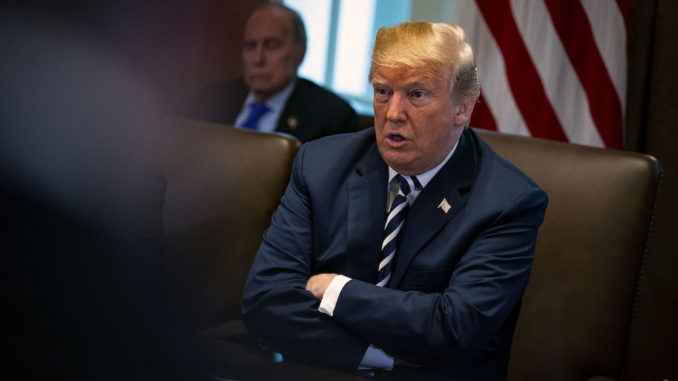
Secretary of State Mike Pompeo completed his second trip in as many months to North Korea, returning with the remaining three American hostages and setting the agenda for the historic summit—which President Donald Trump just announced will be held on June 12 in Singapore.
Reading news reports out of last month’s meeting between the leaders of the two Koreas could lead one to conclude that Kim Jong Un is ready to abandon North Korea’s nuclear program in exchange for security guarantees from the United States. If accurate, this may be the basis for a peaceful, diplomatic outcome to one of the most urgent security threats facing the United States.
But before we declare peace or book flights to Oslo for the Nobel ceremony, let’s take account of lessons from prior negotiations with North Korea to counter what is likely Kim’s attempt to undercut support for sanctions and drive a wedge between the United States and South Korea.
The Panmunjom Declaration, issued after the late April meeting between Kim and South Korean President Moon Jae In, feels like a Hollywood movie remake with new actors but the same tired story. North Korea has pledged on multiple occasions to not to acquire nuclear weapons, beginning with the North’s accession to the Nuclear Non-Proliferation Treaty in 1985. In 1992, Kim’s grandfather committed to three no’s: no nuclear weapons, no nuclear reprocessing and no uranium enrichment. North Korea was caught red-handed cheating multiple times on all three nuclear no’s, but still received security assurances from the United States in 2005, when both sides pledged “to respect each other’s sovereignty, exist peacefully together” and normalize relations. All of these efforts ended in the same place, with a different Kim breaking his promises and enjoying tangible concessions from the United States and its allies.
To counter Kim’s smile diplomacy and avoid his trap, the Trump administration should take four lessons from prior negotiations with North Korea, Libya and Iran.
1. Be prepared to walk away from the table. The previous three American presidents, Republicans and Democrats alike, have all negotiated flawed nuclear deals with North Korea. The Kim family has played the United States, in part, by insisting on long, drawn-out negotiations. If North Korea rejects the reported U.S. insistence on quick denuclearization—complete, verifiable and irreversible—Trump should return to Washington and amp up the maximum pressure campaign focused on hurting Kim where he cares most: North Korea’s creaking economy, which he’s vowed to improve. Trump should remember his predecessor’s refrain on the Iran nuclear deal that “no deal is better than a bad deal.” Except this president should mean it, and back up his words with deeds.
2. Nuclear-only deals do not solve the strategic issues. Trump exited the Iran nuclear deal, the Joint Comprehensive Plan of Action, because it suffered from a number of fatal flaws, including its sole focus on the nuclear issue to the exclusion of Iran’s other problems (terrorism, human rights, missiles, regional aspirations). The Trump administration is now dealing with the failure of Obama’s aspirational foreign policy, which was supposed to moderate the hard-line clerics who really run Iran. A deal with North Korea that focuses only on its nuclear program will leave Pyongyang’s military threat intact, including its missile force and chemical and biological weapons capabilities. This threat will need to be addressed, and so will the North’s proliferation and cyber activities, and its abhorrent treatment of its own citizens. While the end of the North’s nuclear program would be a major accomplishment, it will leave other challenges to be overcome.
3. Insist on the Libya model of denuclearization. The sequencing of denuclearization will show how serious North Korea is about this process. Pyongyang will likely prefer to use Kim Jong Il’s framework, where both sides participate in long, drawn-out negotiations. This would allow the North to continue his nuclear weapons program and run out the clock to the U.S. 2020 presidential election. The United States should insist instead on the Libya model for denuclearization: complete, total and near-instantaneous. This will not come cheap; Pyongyang will insist on significant U.S. concessions. But there’s another reason to push for the maximum: Iran is watching Trump’s North Korea dealings, closely, and any precedent set with Kim will be noted in Tehran.
4. Don’t release the pressure. The past two presidents have relieved effective sanctions pressure before receiving tangible results. In 2007, the George W. Bush administration relieved sanctions on a key bank facilitating North Korea’s illicit activities and removed Pyongyang as a state sponsor of terrorism. In return, the U.S. received empty promises and the North Korean actions were easily reversible. In 2015, the Obama administration relieved crushing sanctions on Iran that had harmed the Iranian economy. With North Korea, Trump should hold off on sanctions relief until Kim takes real—and irreversible—actions toward denuclearization.
The Trump-Kim summit is an achievement in and of itself. But it could easily fail. Fortunately, Trump possesses the upper hand thanks to his team’s adept use of all the elements of American power. If Kim balks, Trump should ramp up the economic and military pressure. That’s really what Kim fears, and Trump should use that leverage to his advantage.
Anthony Ruggiero, a senior fellow at the Foundation for the Defense of Democracies, was the nonproliferation advisor to the U.S. delegation to the 2005 rounds of the Six-Party Talks and spent more than 17 years in the U.S. government. Follow him on Twitter @_ARuggiero.
END

Be the first to comment